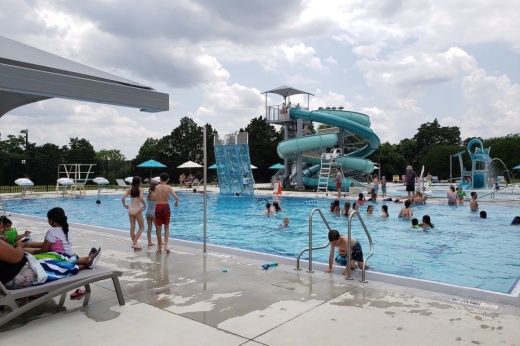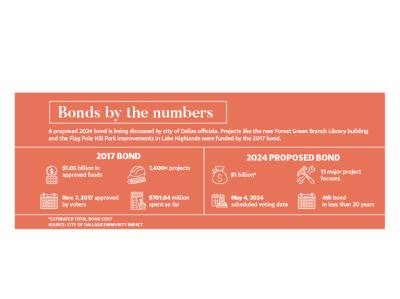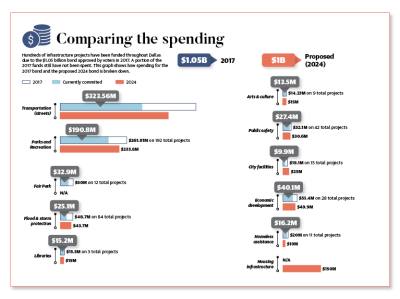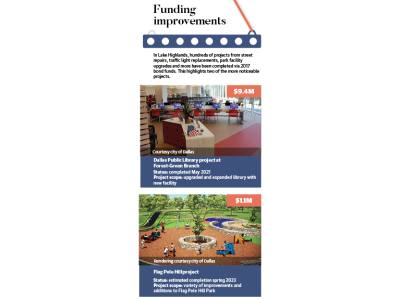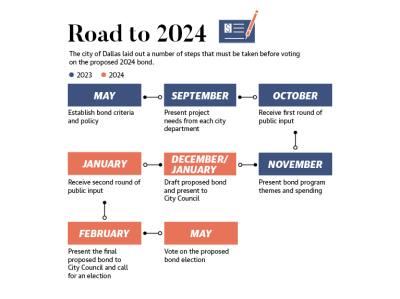City staff presented a draft plan for a 2024 bond package to Dallas City Council during an Aug. 17 meeting. If council calls the bond, the proposal would go before voters as part of the May 2024 election, according to a city presentation during the meeting. The presentation states that maintaining the current property tax rate of $0.7458 per $100 of assessed value would be needed to help fund the bond.
The 2024 bond proposal is meant to be similar to the 2017 bond program, according to Adriana Castaneda, Office of Bond and Construction Management director. She said the bond proposal is not set in stone and was largely presented to get discussion and planning started. District 10 Council Member Adam McGough, who represents the Lake Highlands area, said it is vital for residents and officials to begin taking stock of infrastructure needs now. That way future bond funds can be tailored in the best way for the Lake Highlands area, he said.
“It is figuring out how do we properly prioritize our needs and then how do we allocate the bond funding in the most appropriate, the most efficient and the most equitable way,” McGough said. “You are going to have 14 council districts plus the mayor that are all advocating for projects that impact the people we serve. You have to really advocate for the projects that are most important in your community.”
McGough said that when looking at the proposed 2024 bond and what infrastructure projects it could fund, it is important to look back at what the 2017 bond accomplished. McGough said he, local officials and residents had to strongly advocate and even protest to ensure some of the biggest projects that affected Lake Highlands were included in that 2017 bond.
“Three of our biggest projects, the Willie B. Johnson [Recreation] Center, the Forest Green Library and the [Lake Highlands North Aquatic Center] were all pulled out of the [2017 bond] ... at the last minute,” McGough said. “It wasn’t until we really pulled everybody together in the community and there were walks and protests [in Lake Highlands] and we really represented [Lake Highlands] well that we got our rec center, our library and our aquatic center back in the bond. So one of the messages people have to realize is, it starts now.”
Figuring out the needs
Since 2006, Dallas has authorized up to $3 billion in bond funding. Most of that funding has gone to street and transportation improvements, according to a city presentation. Dozens of street projects have taken place across the Lake Highlands and Lakewood areas since 2017 as part of the previous bond package. McGough said the main focus for Lake Highlands in the next bond will likely be improving the Skillman corridor, a stretch of road from the Forest Lane and Audelia Road intersection to the Skillman Street and Abrams Road intersection.
The ongoing $1.74 billion 635 East Project includes a revamp of the Skillman interchange by simplifying the tangle of roads and building an iconic arched bridge akin to the Margaret Hunt Hill Bridge that connects west Dallas with downtown. Local officials said this will act as a new gateway into Lake Highlands and lead into the Skillman corridor.
“We have a huge opportunity with this [2024 bond],” McGough said. “We really can clean up and beautify and put some infrastructure in place to come alongside developments down Skillman, and it can become this Main Street. With the right investment, we’ll continue to see that grow, and then you just connect all the way along Skillman, and it opens up a lot of opportunity for other types of things that the community really wants and needs.”
In Lakewood, District 9 Council Member Paula Blackmon stated that the 2024 bond funds will likely be needed to dredge White Rock Lake. Blackmon said, in a city memo, that the lake dredging would remove accumulated sediment from the lake to restore depth and maintain water quality. Dredging could cost between $32 million-$88 million, according to a city study.
According to Castaneda, the 2024 bond would include 11 proposals totaling $1 billion. Like 2017, the majority of the proposed 2024 bond funding is expected to be used for street and transportation improvements. A $325 million proposal for street improvements combined with another $101.9 million measure for transportation projects is a large part of the measure.
Officials said a $150 million measure would be used to invest in housing infrastructure.
“Many of these figures are mainly to fuel discussion,” Castaneda said. “We just wanted to come up to the $1 billion number so that [council members] could give us feedback. The numbers will need to align with the needs. Once we get more feedback, we can align our propositions accordingly.”
The bond proposal also has a $233.8 million plan to renovate parks and recreation facilities. Another $43.7 million measure is also included to help mitigate storm drainage concerns.
Castaneda said the proposed bond would provide more than $85 million toward renovations of city facilities. This includes over $30 million for public safety facilities, $15 million for library facilities, $15 million for cultural arts facilities and $25 million for other city facilities. The bond would include nearly $50 million for economic development and $10 million for homelessness programs.
Improvements from 2017
Alongside a number of other infrastructure projects, improvements to city facilities that serve Lake Highlands residents were funded as part of the 2017 bond package.
The Lake Highlands North Aquatic Center was opened in 2019 at a cost of $5 million; a new “state-of-the-art” building for the Forest-Green Branch Public Library opened in May 2021 for $9.4 million; security enhancements were completed at the Dallas Police Northeast Station for over $1 million in 2018; and $1.1 million in improvements at Flag Pole Hill Park are ongoing.
In Lakewood, a $4.9 million widening and expansion of White Rock Lake Trail is set to finish this fall, and a resurfacing project on Matilda Street from Winston Street to Belmont Avenue was completed in 2018 for $1.5 million. The city has an interactive website that shows where all the 2017 bond projects have been completed as well as ones to be completed by 2024.
McGough said soon he is going to form a bond task force that will include local residents and community leaders. He said the most important thing for residents to do right now is pay attention in the community.
“If there is something [residents] really care about, they need to advocate,” McGough said. “It is going to be crucial that the community comes together around the things that are most important.”




